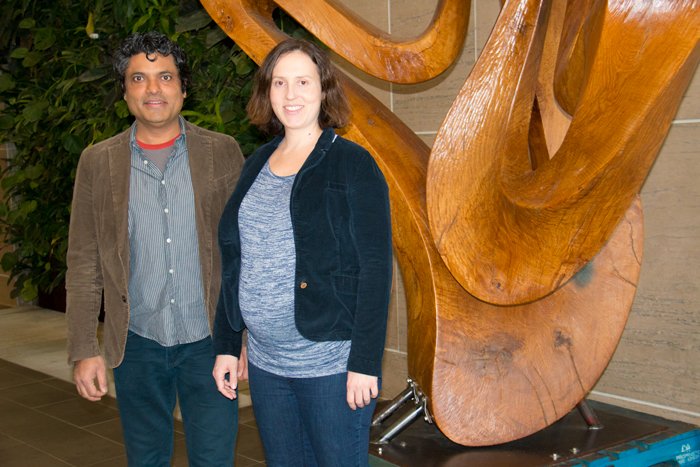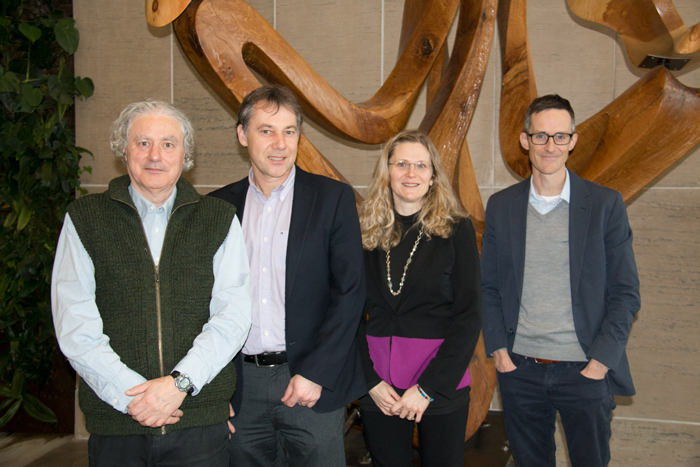The issue of climate change is often viewed as primarily a challenge for scientists.
But over the past twenty-five years, we’ve seen many instances where policymakers have been unable to uphold their part of the bargain: to enact policies that will change people’s behaviour and slow the build-up of carbon emissions in the atmosphere.
That’s where researchers in the Faculty of Public Affairs are playing a crucial role. Several will be taking part in discussions at the Faculty’s Visions for Canada 2042 conference in early March, which will feature remarks from the Honourable Catherine McKenna, Canada’s Minister of the Environment and Climate Change.
These researchers are studying which policies work—and which don’t—to help Canada and other countries move green energy ideas out of the laboratory and into government, industry, and our homes.
“The energy revolution isn’t just about new technologies,” explains André Plourde, the Dean of the Faculty of Public Affairs and an energy economist. “It’s about designing policies that will influence individual and collective choices that are the only path to dramatically lowering climate emissions.”

(left to right) Hashmat Khan and Maya Papineau. Missing from photo, Konstantinos Metaxoglou
Taxing Carbon
In December, the Trudeau government announced a plan to address that concern by compelling a change in Canadians’ energy consumption—through a national carbon tax. The tax will be levied on the emitters themselves, with some of the costs likely passing down to consumers.
“It’s a significant step,” says Assistant Professor Maya Papineau, an environmental economist in the Department of Economics. “If a firm is emitting pollution that is causing damage to a third party—such as the residents of a polluted city—and it’s not paying for the damage, that’s a problem.”
The federal government’s carbon pricing plan sets a minimum price that emitters must pay per tonne of carbon. Some provinces are already charging polluters, while others are just getting started.
“They started out at a low entry level carbon price, but they’ve committed to increasing the charge in the future,” says Dr. Papineau. “If they follow through, it will be effective.”
Her colleague, Economics Professor Hashmat Khan, is less optimistic. He tracks the fluctuations of carbon emissions during economic booms and busts.
“Now that the Liberals are in office, they can drive this agenda and they still have time to make adjustments,” says Professor Khan. “My worry is that they’re so caught up in political feasibility, they’ve introduced a low price that won’t increase and won’t have the sufficient quantitative impact.”
Professor James Meadowcroft, of the School of Public Policy and Administration and the Department of Political Science, also questions the potential impact of a carbon tax. He studies climate and energy policy, negative carbon emissions, and consults with governments on these matters.
“It’s the demand for fossil fuels that we have to stop, so that no one will want to be driving a gasoline-fueled car,” argues Professor Meadowcroft. “A carbon tax won’t reach the point where people will rush out to buy an electric vehicle. Policies like new technology development, building codes, and regulations will do the real work.”
Big Consumers
Professors Papineau and Khan are taking a closer look at those policies as well.
Along with their colleague, Assistant Professor Konstantinos Metaxoglou, they’re studying the problem posed by energy use in commercial office buildings. The commercial sector in Canada is projected to have the highest annual energy consumption growth over the next two decades—in part because they lack the incentives to conserve.
“Many tenants don’t pay their energy bill, so their incentive to conserve is mitigated. It’s a well-known market failure that requires incentives to invest in energy efficiency,” says Professor Papineau. However, she says there may be some improvements in the sector in light of the federal government’s new funding for energy retrofits in buildings.

(left to right) James Meadowcroft, Stephan Schott, Alexandra Mallett and Graeme Auld
Looking to the Arctic
While Faculty of Public Affairs researchers are assessing what governments are already doing, they’re also trying to identify what works. In the School of Public Policy and Administration (SPPA), a small team led by Professors Alexandra Mallett and Stephan Schott have examined efforts underway in the Canadian Arctic.
“Consumers and businesses in the Arctic have to cope with high energy prices while dealing with extreme living conditions,” they wrote for their Report on the State of Alternative Energy in the Arctic.
These conditions, coupled with supportive policies and organizations, “have led to increasing usage of renewable sources in the form of solar photovoltaic technologies, wind turbine installations and biomass generators” in various places within the region.
“We are working with Northern partners to identify further research needs and policy adjustments,” says Professor Schott, who visited the region six times for various projects since October 2015. “This is a collaborative exchange of experiences and initiatives to promote alternative energy solutions across Canada’s North.”
Long-Term Changes
But once green energy policies and changes are put in place, will they have lasting consequences?
Drawing on a review of 165 published studies, Professors Graeme Auld and Alexandra Mallett have identified certain characteristics that contribute to successful green energy policies. The SPPA researchers say that policies with defined time frames, built-in flexibility that allows for a range of compliance options, and monetary incentives or disincentives (like a carbon tax) are common in well-functioning plans. But they conclude that the interaction of all of these factors may prove even more crucial.
“For a problem of the size and complexity of climate change, it is arguably the aggregate effect of new and old policy interventions…that must be the focus of attention in order to understand how and whether policy innovation helps or hinders,” they wrote in a 2014 article in the journal Global Environmental Change.
Professor Auld and his co-authors Kelly Levin, Steven Bernstein, and Benjamin Cashore describe climate change as a super wicked problem. Reflecting the findings of this work, Professor Auld argues we need “sticky interventions that entrench support over time while expanding the populations they cover.” The key, he says, will be to find means to “constrain our future collective selves.”
Rapid Change
From Professor Meadowcroft’s perspective, there may be another—or additional— phenomenon that leads to radically altered human behaviour.
“Something will start to change—like the conversion to electric vehicles—and then it will happen very quickly. Think about the adoption of the smartphone: it suddenly grew over four or five years,” he explains. “The transition away from fossil fuels will be disruptive, not orderly. The tipping point will come quickly.”
Friday, February 3, 2017 in CSPC2021, Department of Economics, FPA Voices, Public Policy and Administration, Research, Research Series
Share: Twitter, Facebook



